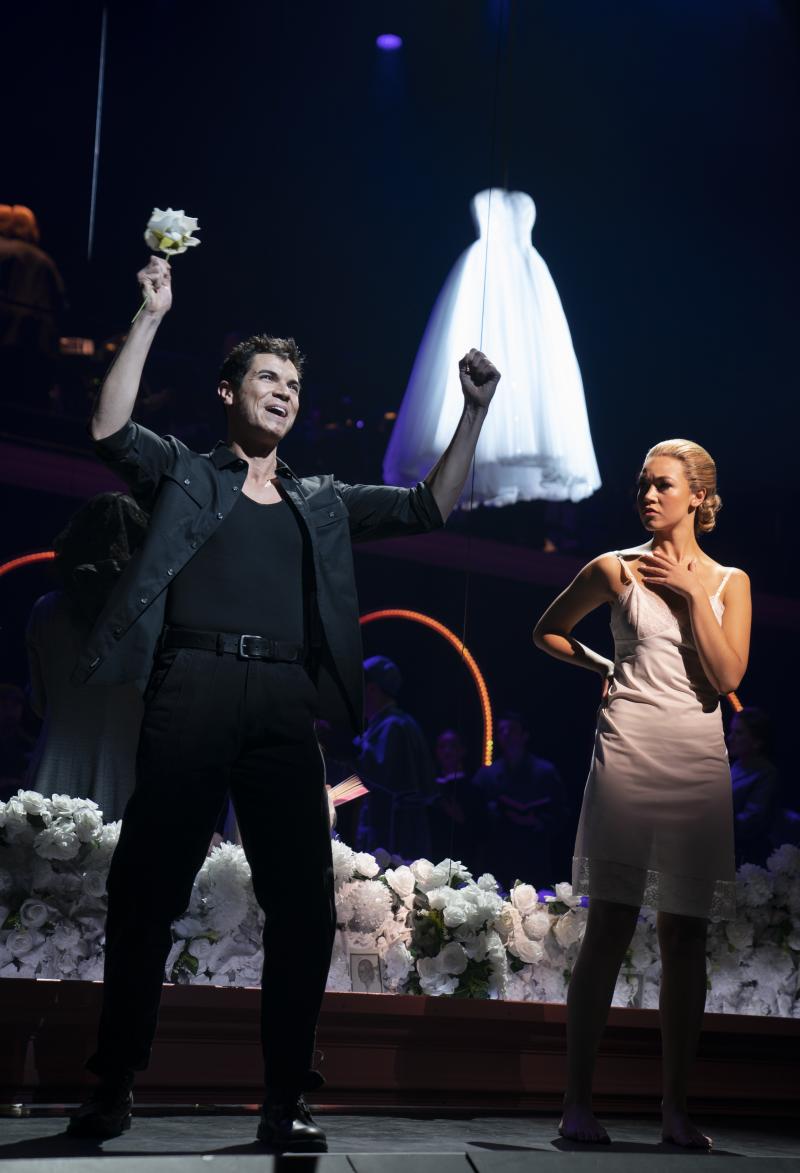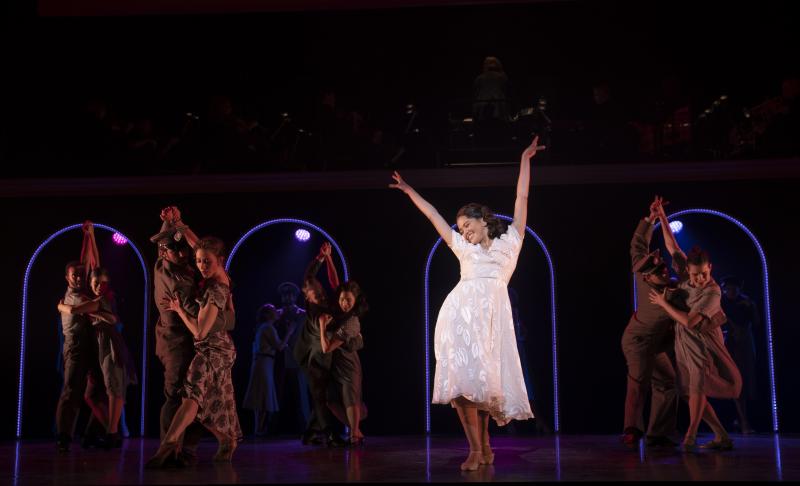Review: New York City Center Presents EVITA In A Time When News Commentators Outshine Newsmakers
Great comedy is often the byproduct of political scandal and those who humorously comment on the news often outshine the newsmakers themselves. You might say that more Americans learned about the controversies of Presidents Lyndon Johnson and Richard Nixon from watching The Smothers Brothers and Mort Saul, rather than Walter Cronkite. For over forty years our perceptions of world leaders have been defined more by the impersonations seen on Saturday Night Live than by actual news clips. And today there are a multitude of television hosts combining comedy with deep analysis and investigative journalism to editorialize on the goings-on of the current administration.

(Photo: Joan Marcus)
What does this have to do with New York City Center's gala presentation of Andrew Lloyd Webber and Tim Rice's rock opera, Evita, chronicling Eva Peron's rise from the slums of Los Toldos, Argentina to become a nationally known actor and eventually be regarded as a saint while acting as the muscle behind the administration of her husband, President Juan Peron?
It's all in the snazzy performance of Jason Gotay, playing the piece's narrator and commentator, Che. Though the role is traditionally played to suggest a revolutionary insurgent, Gotay, dressed casually in black by designer Alejo Vietti, comes off more like a George Carlin-ish stand-up in the opening scene as faces the audience and wryly sings "Oh, What A Circus," mocking the anguished mourning of his fellow Argentinians upon the death of their national Cinderella, who, through attention-grabbing public acts of charity and progressiveness, paired with a finely cultivated image as a simple country girl who got lucky, masked the corruption and violence that brought her and her husband into power.
While Che isn't exactly scripted as a comic role, Gotay, with his jaunty delivery and limber physicality, takes in the audience as his confidantes, even while the object of his criticism stiffly tries to stare him down. The commentator chooses to be amused by the public seduction performed by the late first lady and only sporadically lets his outrage surge to the surface. It's a terrific, engaging performance that's the highlight of director Sammi Cannold's oddly passionless production.
Solea Pfeiffer, who this reviewer praised for her acting and singing in her last City Center appearance, in Jason Robert Brown's SONGS FOR A NEW WORLD, plays the title role for most of the evening (more on that later), is perhaps the most subdued Eva Peron imaginable. For the entirety of the first act of, and most of the second, she sings in an expressionless manner that hugs onto the melody line with barely any phrasing of interest. Her face and physicality also reveal little in the way of feeling. It's only when the dream life she created begins to crumble that her Eva displays rising emotions.
15-year-old Eva, whose plan to escape poverty for the glamour of Buenos Aires involves becoming the mistress of sleazy middle-aged crooner Magaldi (excellent work by Philip Hernandez as a predator who doesn't realize he's being preyed upon) is played by Maia Reficco, who sings very loudly and without much variety of expression.
Though Reficco is replaced by Pfeiffer rather quickly, Cannold has her appearing now and then in moments when the older Eva remembers her former self. This is very effective in the opera's closing moments when the dying woman imagines a montage of her past, but sadly, it's also used to take focus away from Maria Cristina Slye's beautifully introspective performance of "Another Suitcase In Another Hall", playing the previous mistress of Juan Peron who Eva abruptly ousts.
Enrique Acevedo displays a sweet singing voice and a distinguished look as Juan Peron, but his character comes off more as Mr. Cellophane than Mr. President.

(Photo: Joan Marcus)
As the audience enters, designer Jason Sherwood's set - an empty white ballgown suspended over long platforms containing white roses - might suggest the never-completed monument that at first was planned by the Perons to honor the working man and then was rethought to become Evita's mausoleum. As the opera is performed, the platforms individually move up and down into formations, for reasons this reviewer cannot imagine.
As always, City Center's musical theatre productions are highlighted by the kind of full orchestras we rarely see on Broadway anymore. Perched above the proceedings, music director Kristen Blodgette conducts 24 musicians playing orchestrations by David Cullen and Webber, based on the composer's original work, that effectively move from traditional and pop Latin rhythms to jarring moments of 1970s rock.
Like Eva Peron herself, Evita is a theatre piece that can overwhelm viewers emotionally through its frequently stirring music, overshadowing a narrative that, despite some smart verbal flourishes by Rice, is rather perfunctory. Some great actors have delivered memorable performances in its leading roles, but they've done so by illuminating ideas in the text that explore the psychology of massive public seduction and the self-seduction that convinces tyrants that they are saints.
Reader Reviews



